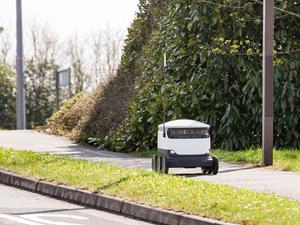
Kashyap Deorah has built a few tech companies.
In the 1990s, he founded his first startup in India which was eventually acquired by a Bay Area company. He then spent some time working with other deep tech startups before jumping into e-commerce and building mobile payments software for restaurants. Eventually, he sold that company to OpenTable.
Now Deorah, 42, is diving into logistics with HyperTrack, a San Francisco-based startup developing tools that aim to solve the minutiae of last mile delivery for e-commerce businesses. He co-founded the company in 2015.
On Wednesday, HyperTrack announced $25 million in new funding from a Series A round that was led by WestBridge Capital and Nexus Venture Partners.
Raising the seed round was relatively easy because he's a seasoned entrepreneur, Deorah told me. But for HyperTrack's Series A, he and his team had to show investors there was a real business to back.
"Investors needed to see more proof of a real business, real customers who are growing that you've landed and expanded, who are loyal to you" because we're critical to their mission, Deorah said.
Since launching, the company has expanded its services from primarily tracking orders for its customers to helping them assign deliveries to drivers and plan around their product inventory. And HyperTrack is building software particularly with the gig economy in mind.
On Wednesday, HyperTrack launched a free service called BuilderX, which allows developers to create a hypothetical blueprint for their delivery needs amid growing consumer demand for quicker deliveries and an increased reliance on independent contractors who want flexibility.
"People want to login and say, 'I want to work now' and sometimes work multiple services at a time, whichever pays them more and has that flexibility," Deorah said. "Some are working full-time for certain services, some are working part-time. What that does in logistics planning is, whether I have on demand orders or scheduled orders, whether I'm fulfilling products or services, it makes the workforce much more elastic. So it needs that much more technology to figure out who to dispatch the orders to."
To solve for this, HyperTrack creates application programming interfaces, or APIs, that give other developers access to tools that would be more expensive and take longer to build from scratch such as mapping and geolocation services.
HyperTrack can get a company set up with planning, driver assignments, live delivery tracking for consumers and an operational dashboard within 30 days, HyperTrack's VP of marketing Gaurav Deshpande told me. Its mapping tools, for example, use real-time delivery and fulfillment data to automatically improve itself over time, and it's already outshining his personal Tesla car.
"I love the car, I can't say enough good things about it. But every time that I come back home, about 50 feet before I've reached home, it says I've reached home," Deshpande said. "I've been doing that for a thousand times, at least, since I bought the Tesla and never has the damned thing learned the address."
The company says there are around 300 active projects using its APIs, and about 50 of them are paying customers whom it charges on a per-order basis.
HyperTrack set it up that way instead of using a subscription model in order to give customers predictable pricing based on their actual usage. It also positions the company as a competitor to third-party logistics software from big tech companies like Google and Amazon.
Retailers, in particular, tend to be more anti-Amazon and hesitant to use the giant's services over data concerns, Deorah said, while some logistics companies are becoming wary of Google's complicated pricing.
Businesses of any size can use its APIs but HyperTrack says its sweet spot is hyper growth startups.
HyperTrack has already doubled its own workforce this year to 32 people, and Deorah wants to fill out the team with around eight more people, particularly with roles that are focused on marketing, sales, product and engineering. The company wants to build out its artificial intelligence capabilities and create seamless integrations for third-party services like Salesforce.
Deorah wants to make sure to create a diverse candidate pipeline for HyperTrack’s open roles, as well. High on the list of roles to fill is one for a sales leader, and he told the team that the company will keep the applications open until at least half of the candidates are women.






